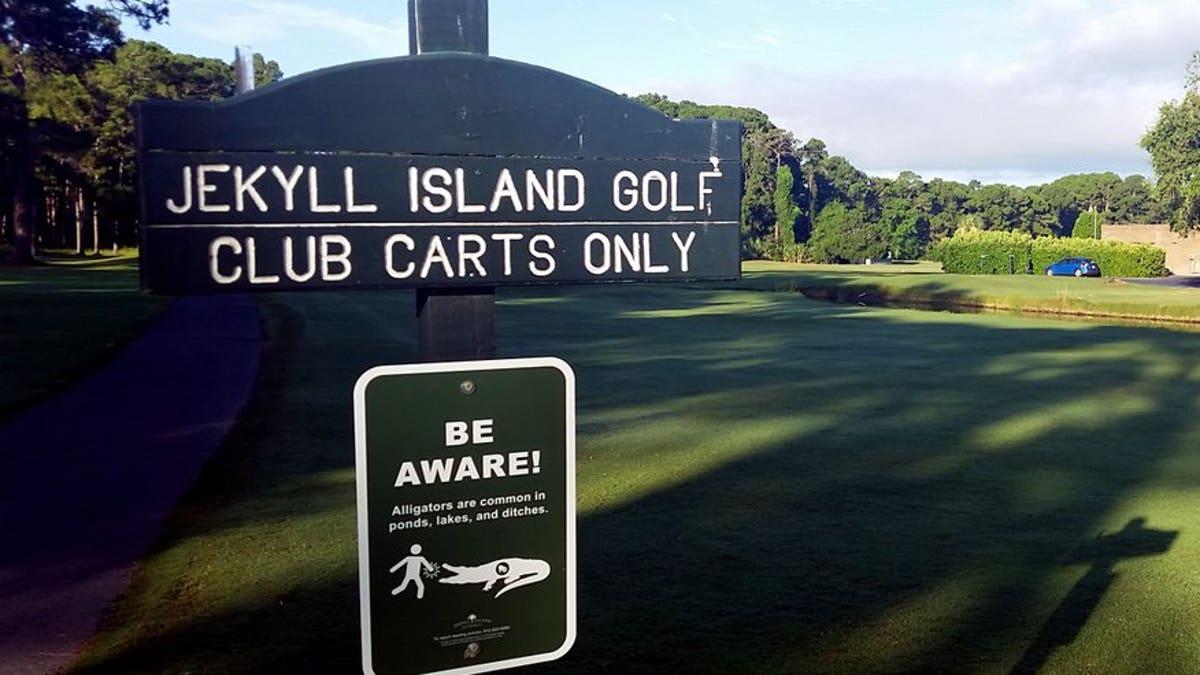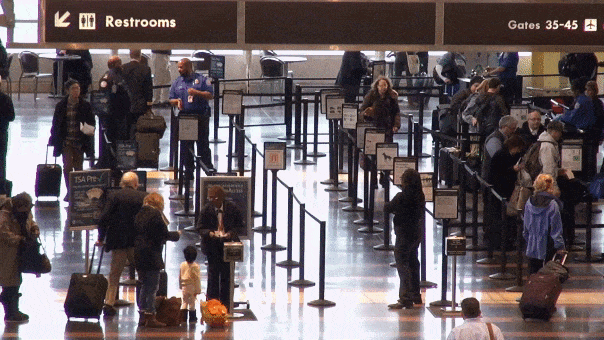
A sign warns golfers to “Be Aware” of alligators on Jekyll Island, Georgia. The state park recently placed roughly 30 signs at golf course entrances, ponds and ditches to make sure visitors know the island is home to an abundance of alligator populations. (Jekyll Island Authority via AP)
Known for sea turtles nesting on its beaches, wading shorebirds in the surf and white-tailed deer that roam its maritime forests, Jekyll Island has taken extra steps to make sure visitors realize the state park is also home an abundance of alligators.
The Jekyll Island Authority, which manages the island 70 miles south of Savannah, in the last month posted nearly 30 signs at the edge of ponds, alongside ditches and at entrances to its four golf courses. The signs urge visitors to "Be Aware Alligators Are Common in Lakes, Ponds and Ditches" and tell them "Do Not Feed Wildlife," each printed with a gator graphic.
It's no coincidence the new signage went up not long after an alligator killed a toddler this summer in a lake at Walt Disney World, said Ben Carswell, the island's conservation manager. But he said Jekyll Island staff had already been working on notices to discourage tourists from tossing food to alligators, particularly at a pond next to a picnic area.
"We took a hard look at what sort of information we were getting out to people about the presence of alligators on Jekyll Island," Carswell said. "We don't want people to be scared about nature and wildlife on Jekyll. But we want them to be aware of it and what these animals and their behaviors are."
Once a remote getaway for wealthy industrialists, Jekyll Island became a state park after the state of Georgia purchased it in 1947. State law requires that two-thirds of the island remain undeveloped, ensuring people share the park with a wide range of wildlife.
Researchers conducting population surveys have counted anywhere from 67 to 124 alligators on Jekyll Island, which covers roughly nine square miles of uplands and marsh. Tourists often don't have to look hard to see them. Online videos posted by visitors show gators lounging in water next to a bike path, crawling into bushes outside a public building and even strolling along the open beach toward the surf.
And Jekyll Island has embraced the carnivorous reptiles as a means for teaching people how to coexist with wildlife. The Georgia Sea Turtle Center on the island offers classes on "Gatorology 101," teaching tourists not only about alligator conservation but also how to safely observe them.
Documented cases of alligators injuring people are rare across Georgia. The only known incident on Jekyll Island happened 22 years ago.
According to cases compiled by the Georgia Department of Natural Resources, a golfer trying to fetch balls from a pond on a Jekyll Island golf course got his hand chomped by an alligator in August 1994. The wound required 20 stitches.
"You're more likely to get hit by lighting, or get attack by a dog or stung a bee and have death occur from that, than be attacked by an alligator," said Greg Waters, a DNR biologist who specializes in alligators.
Jekyll Island's new alligator awareness efforts come at a time when new hotels, convention space and other amenities are drawing many visitors to the park for the first time. For the first half of this year, the Jekyll Island Authority says, vehicle traffic increased 25 percent compared to the same period in 2014. Hotel revenues were up 60 percent.
With all those tourists come inevitable reports of people tossing food to alligators. Carswell said on a busy summer weekend that probably happens at least once or twice, particularly when the island has picnic tables next to a pond.
"Sometimes feeding turtles and fish is sort of a gateway to feeding alligators," Carswell said.
Besides the potential danger, there's another reason not to throw food to alligators: it's illegal. Feeding wild alligators is a misdemeanor in Georgia. Violators can be fined as much as $200 and jailed for up to 30 days








































